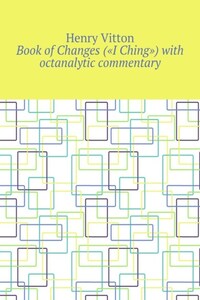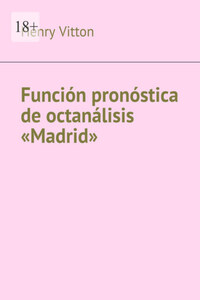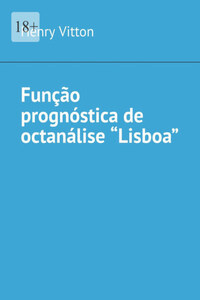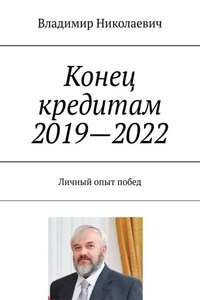Book of Changes (“I Ching”) with octanalytic commentary
The I Ching or Zhou Yi is the earliest Chinese philosophical text. The earliest layer, traditionally dated to c. 700 BC and intended for divination, consists of 64 hexagrams. “The Book of Changes” is the name attached to the “I Ching” in the West.
The book consists of 64 characters – hexagrams, each of which expresses a particular life situation in time from the point of view of its gradual development. Symbols are made up of six lines; the lines indicate successive stages in the development of a given situation. Lines are of two kinds: either solid (they are also called nines), or interrupted in the middle (sixes). The former symbolizes the active state, light, tension (yang), and the latter symbolizes the passive state, darkness, compliance (yin). It is generally accepted that the lines are read from the bottom up; their sequence describes the development of the situation.
Each hexagram can also be represented as a combination of two trigrams. Each hexagram, as well as each line in the hexagram, is accompanied by a set of aphorisms, which should give advice to the fortuneteller.
The modern method of analysis of the psyche “Octanalysis” [1—15] makes it possible, on the basis of scientific data on the human psyche, to write an octanalytic commentary for the Book of Changes.
Octanalysis distinguishes eight instances in a living system (mental states, components of the psyche, vectors, layers of the psyche, vibrational levels, resonant levels, fundamental principles of being) 0-Source, 7-Imagination, 6-Subconscious, 5-Soul, 4-Heart, 3-Irratio, 2-Ratio, 1-Mind. Using the methods of octanalysis, their harmonious, natural, impeccable hierarchy, top to bottom, 0, 7, 6, 5, 4, 3, 2, 1 (in binary 000, 111, 110, 101, 100, 011, 010, 001) was discovered. At any given time, one of these eight instances dominates the living system.
2. The designation of 8 trigrams of Fu Xi
The legendary first emperor of China (Celestial Empire) Fu Xi (2852—2737 BC) created the first eight trigrams (Kun, Qian, Dui, Li, Zhen, Xun, Kan, Gen), fundamental principles of life.
The trigram consists of three horizontal lines, located one above the other. Each of the lines can be a whole horizontal line” – » (strong line, “nine”, “son”) or a horizontal line interrupted in the middle "– -" (weak line, “six”, “daughter”).
Let’s introduce the digital designation of trigrams, which is convenient for converting numbers from binary to decimal. Let us designate in the trigram the whole horizontal line” – » (“nine”) as “1” (“phallus”), and the horizontal line interrupted in the middle “– -” (“six”) as “0” (“vagina”). In the numerical designation of the trigram, for example “011”, the digit on the left “011” indicates the lower line of the trigram, and the digit on the right “011” indicates the upper line. Then the designation of eight trigrams will look like:
000 (Kun, mother);
111 (Qian, father);
110 (Dui, third daughter);
101 (Li, second daughter);
100 (Zhen, first son);
011 (Xun, first daughter);
010 (Kan, second son);
001 (Gen, third son).
Names of trigrams are given in parentheses.
The eight instances of the psyche, studied in octanalysis, uniquely correspond to the eight trigrams of Fu Xi:
0-Source / Kun, mother;
7-Imagination/Qian, father;
6-Subconscious/Dui, third daughter;
5-Soul/Li, second daughter;
4-Heart/Zhen, first son;
3-Irratio/Xun, first daughter;
2-Ratio/Kan, second son;
1-Mind/Gen, third son.
3. The dominance cycles of Fu Xi Trigrams
In the harmonious, impeccable, natural, top to bottom, 07654321-hierarchy of the eight instances of the psyche, the instance (trigram) 0-Source / Kun (mother) is in the first place, and the instance (trigram) 7-Imagination / Qian (father) is in the second place, which reflects the deep meaning of arrangement of Universe. Introversion, turning attention inward, is characteristic of mother. Extraversion, turning attention outward, is characteristic of father.
In the human race, the biological mechanism of immortality (childbirth) is carried out by the mother’s womb. The Universe’s mechanism of human immortality is carried out by the instance of the psyche 0-Source (Unified Consciousness) – the trigram Kun (mother). Instance 0-Source/Kun (mother) is a cornucopia from which emanations come and what we call the Universe is created.
In the process of human activity, the instances of his psyche (Fu Xi trigrams) dominate in turn. For example, a full cycle of instances dominance with observance of an harmonious, impeccable hierarchy of instances is the 076543210-cycle. Instance 1-Mind/Gen shows a sense of superiority and is able to deviate from the principle of impeccability and establish any other hierarchy of instances in the psyche.
Octanalysis notes that the personality of a person has a five-component structure, which includes
• three instances of consciousness 5-Soul/Li, 4-Heart/Zhen, 1-Mind/Gen;
• two instances of the unconscious 3-Irratio/Xun, 2-Ratio/Kan.
A complete cycle of dominance of personality instances with observance of an impeccable hierarchy of instances is the 543215-cycle.
A person with psychological problems, acting within Karpman’s dramatic triangle (instances 3-Irratio/Xun, 2-Ratio/Kan, 1-Mind/Gen), performs the 1321-cycle. The terrorist criminal operates in the 131-cycle.
4. Congenital dominance of Fu Xi Trigrams
The octanalysis method revealed the effect of congenital dominance of personality instances (Fu Xi trigrams) [4], which depends on the date of birth of a person and manifests itself to the same extent throughout a person’s life.
An analysis of people’s behavior shows that the congenital dominants of the personality (congenital dominant trigrams) most often dominate in the human psyche in the process of his activity.
Octanalysis notes that a person’s personality has a five-component structure. Depending on the date of birth, two to five instances of the personality may show congenital dominance. A person perceives the congenital dominants of his personality as virtues perceives as a talent and applies them to achieve success in his activities.
People in whom only two instances of the five instances of personality show congenital dominance, have a narrow range of professions choice, and they may also have specific problems of adaptation, both social and labor. Such people need psychological support.











